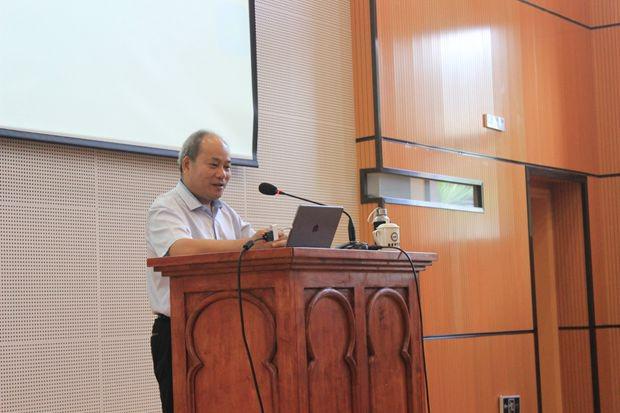In a serial lecture, a music pastor claimed that church music is the epitome of theology.
In the second online lecture on the Sinicization of Sacred Music held by the platform named "Born by Love", Pastor Zhu Guijin, a teacher from the East China Theological Seminary and a member of the Shanghai Musicians Association, gave a speech titled "Theological Language in the Eyes of Musicians". He shared four themes: music is a transcendental language; music from Saint Cecilia; Hans Kung, Barthes, and Mozart; and hymns are the epitome of theology.
In the first part, Pastor Zhu began with the gospel film The Mission, introducing to the listeners how the hero of the film, Spanish priest Father Gabriel, opened the hearts of the uncivilized indigenous Guarani people in South America through a beautiful hymn, so as to stop fighting, establish friendship, plant the seeds of the gospel of heaven in their hearts, and lead them to realize the process of life reversal.
Through the story, Pastor Zhu showed that compared with language and writing, music has the power to cross the gap between regions and races, and this is the important factor why the gospel can take root in South America.
Later, Pastor Zhu explained the painting Saint Cecilia by Raphael, a famous Renaissance artist, elaborating on the wonderful common ground between sacred paintings and sacred music.
In this way, Pastor Zhu reminded his audience that when listening to sacred music, if people are only moved by the beautiful melody, but do not understand the theological meaning behind the lyrics, then they will replace God’s moving with their own feelings, which is absolutely undesirable.
He said that the artist’s depiction of the Saint’s action actually reflects the medieval musical aesthetic view that “vocal music is superior to other musical instruments”.
For such a composition, Pastor Zhu summed it up, “When a person’s solo or chorus singing praises, all other instruments have to make way to vocals because only the human voice is the most important instrument.”
Then, Pastor Zhu added that the music created by God can be divided into three categories. The first category is the sound of all things in the universe, the second refers to the sound of people, and the third denotes the music of various musical instruments created by human hands. Among the three, only the human voice can not only make music sounds but also pronounce words clearly and convey information. Therefore, in praise and worship, we should pay more attention to expressing praise to God with the voice He has given us. And this is exactly the medieval musical aesthetics behind Raphael’s painting.
At the same time, the pastor claimed that the aesthetic view of music is still applicable to today’s sacred music worship, but unfortunately, nowadays, many grass-roots churches have fallen into a misunderstanding by paying too much attention to the role of musical instruments, ignoring the music of human voices, and even some churches put musical instruments on a position higher than the choir, which is really regrettable.
In the third part, the pastor also introduced the music in the eyes of theologians and musicians around the evaluation of musicians Mozart by two theologians of different sects, Hans Kung and Barthes.
The pastor said that although Hans Kung and Barthes belong to Catholicism and Protestantism respectively, both theologians unanimously express their unanimous praise and affirmation for Mozart. Tthe reason is that Mozart affirms God’s salvation in music or theology even in the face of all negativity.
In this way, the pastor led the participants to look back at the whole history of Christianity, and borrows the example of Bach, a music theologian, to prove that music can not only overcome the language barrier but also transcend sects.
Continuing the topic that theologians and musicians have a wonderful resonance in vocal music, Pastor Zhu further extended the content of the fourth part, that is, hymns are the epitome of theology.
He said that the hymns actually express the theological meaning with the help of the lyrics. For instance, in the early church, there are cases where the heretical church and the orthodox church used hymns to convey theological thoughts.
Later, Zhu showed a number of hymns in order to explain many profound theological meanings behind the hymns with different tunes and contents and then points out the truth that “music points to theology”.
Finally, the pastor expressed his hope that with the help of the sharing of the lecture on hymns, people can better understand traditional sacred music while appreciating how these pioneers express their theological thoughts in the language of music, so as to help the church establish the correct path of sacred music.
- Translated by Charlie Li












